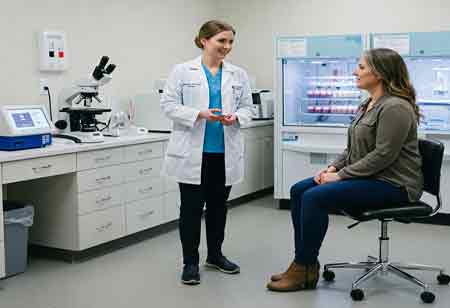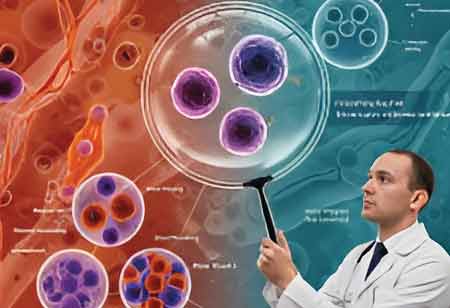Thank you for Subscribing to Healthcare Business Review Weekly Brief
Be first to read the latest tech news, Industry Leader's Insights, and CIO interviews of medium and large enterprises exclusively from Healthcare Business Review
Japan's Role in Global Regenerative Healthcare

By
Healthcare Business Review | Monday, April 07, 2025
Stay ahead of the industry with exclusive feature stories on the top companies, expert insights and the latest news delivered straight to your inbox. Subscribe today.
Regenerative medicine transforms the healthcare landscape by focusing on repairing, regenerating, or replacing damaged tissues and organs. In Japan, this field has rapidly evolved into an industry, reshaping treatment paradigms and introducing new possibilities for restoring human health.
Japan's approach to regenerative medicine combines advanced biological research with clinical application, with a strong emphasis on cell-based therapies, tissue engineering, gene therapies, and next-generation biomaterials. The country’s commitment to biotechnology and the challenges posed by a rapidly aging population have driven significant demand and investment in regenerative healthcare solutions.
Among the most promising developments are therapies utilizing stem cells and induced pluripotent stem cells (iPSCs), which have become central to Japan’s regenerative medicine strategies. These cutting-edge treatments target a broad range of conditions, including neurological disorders, orthopedic injuries, and cardiovascular diseases, offering substantial potential for improving patient outcomes and quality of life.
Technological Innovations and Services in Regenerative Medicine
Japan is a global leader in regenerative medicine, driven by substantial investments in cutting-edge technologies and a progressive regulatory environment. At the core of its innovations are several advanced techniques that have positioned the country at the forefront of this evolving field. Stem cell therapies, utilizing cells derived from bone marrow, adipose tissue, and cord blood, are widely used to repair damaged tissues and organs—particularly in treating cardiovascular diseases, spinal cord injuries, and autoimmune conditions. A landmark contribution from Japan is the development of induced pluripotent stem cells (iPSCs), which involve reprogramming a patient’s somatic cells into a pluripotent state, enabling them to differentiate into various tissue types for therapeutic use.
Japan also leads in 3D bioprinting, enabling the fabrication of human-compatible tissues with applications ranging from skin regeneration to cartilage repair and potential organ reconstruction. Gene-editing technologies such as CRISPR are actively being explored to correct genetic disorders and deliver patient-specific treatments. In addition, tissue engineering practices leverage biomaterials and scaffolds to develop platforms that support healing in burns, ligaments, and other soft tissue injuries.
These technological advancements are underpinned by robust government support and regulatory foresight. The Act on the Safety of Regenerative Medicine (ASRM) provides clear guidelines for cell-based and tissue-engineered treatments, streamlining their development and clinical integration. Japan’s fast-track approval process further accelerates the commercialization of innovative therapies under conditional approval, allowing real-time data collection post-market entry. Strategic financial investments from both public and private sectors contribute to a thriving ecosystem for research and development. Additionally, close collaboration between government bodies, universities, and medical institutions fosters a dynamic exchange of knowledge and facilitates the rapid translation of research into clinical practice.
Applications Across Medical Specialties
Regenerative medicine services in Japan are being applied across various medical specialties. In cardiovascular care, regenerative therapies aid cardiac tissue repair and vascular regeneration for conditions like myocardial infarction. In neuroscience, stem cell and iPSC-based treatments offer hope for patients with Parkinson’s disease, spinal cord injuries, and post-stroke recovery—the orthopedic sector benefits from innovations in cartilage regeneration, bone healing, and ligament reconstruction. Dermatology applications include burn treatment, scar reduction, and cosmetic enhancements through artificial skin and bioprinted tissue. In ophthalmology, iPSC-derived therapies are promising in treating age-related macular degeneration, corneal disorders, and retinal conditions, offering improved outcomes in vision restoration.
Japan's leadership in regenerative medicine continues to garner global recognition. This is driven by strategic international partnerships that facilitate the cross-border exchange of resources, expertise, and innovation. These collaborations further solidify Japan’s position in shaping the industry's future.
Moreover, Japan's world-class standards in treatment facilities set a high benchmark for global healthcare, positioning the country as a premier destination for medical tourism and attracting patients from around the world.
Future Prospects with Convergence and Personalization
Regenerative medicine in Japan continues to advance remarkably, driven by the convergence of artificial intelligence, robotics, and biotechnology. This integration is expected to further refine and expand the scope of treatment services in the coming years. Among the key growth areas is advanced organ regeneration, where bioprinting technologies are being developed to create fully functional internal organs. Artificial intelligence also transforms diagnostics by identifying patients most likely to benefit from regenerative therapies and enabling more targeted, effective treatment plans. Personalized medicine is also gaining traction, with efforts focused on designing therapeutic solutions tailored to an individual’s genetic and physiological profile. To ensure equitable access, initiatives to reduce treatment costs are underway, supporting broader patient inclusion. Additionally, Japan is promoting its innovations in regenerative medicine globally, reinforcing its position as a leader in this transformative field.
Japan has emerged as a global leader in regenerative medicine, consistently advancing innovative treatment services that improve human health. Its pioneering therapies, underpinned by strong regulatory frameworks and a dynamic research environment, firmly establish the nation at the forefront of global healthcare innovation.
Regenerative medicine redefines therapeutic frontiers, offering transformative possibilities and renewed hope for a healthier, more resilient society. With continued progress in technology and innovation, Japan is well-positioned to play a pivotal role in shaping the future of medical science.






